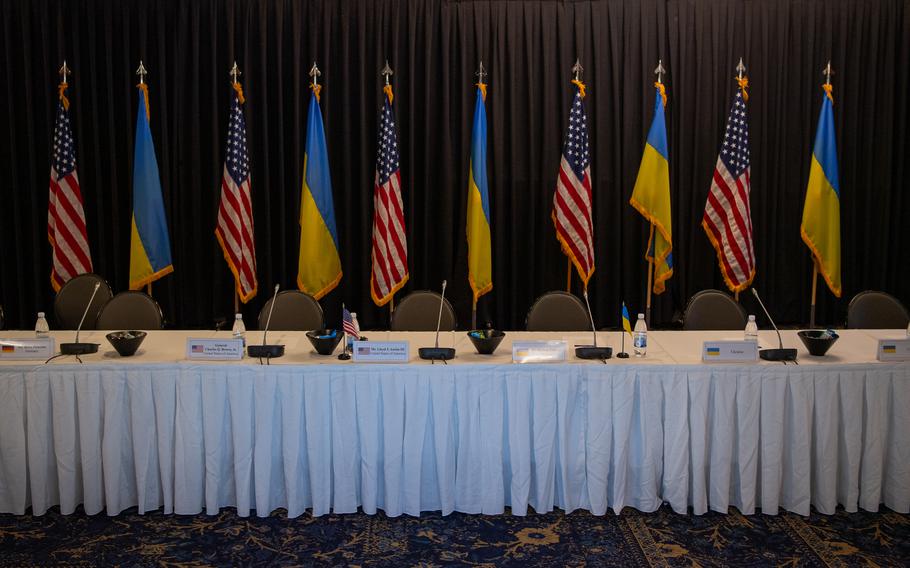
Attendees of the Ukraine Defense Contact Group are welcomed at Ramstein Air Base, Germany, March 19, 2024, during the sixth meeting held at the installation. Ministers of Defense and senior military officials from nearly 50 nations came together to discuss the ongoing crisis in Ukraine and ways to aid the country in its continued defense against Russia. (Dylan Myers/U.S. Air Force)
As the prospects for peace in Ukraine grow, so does the need for scrutiny of the hundreds of billions of dollars in aid that was spent — some say squandered — in support of Kyiv.
On Tuesday, Elon Musk endorsed a statement on X: “Zelensky doesn’t want peace, he wants money and power.” Then on Wednesday, President Donald Trump posted that Volodymyr Zelenskyy, the Ukrainian comedian-turned-president, admitted that half of the aid sent to his war-torn country had vanished.
Whatever the facts, an audit is needed. Corruption in Ukraine runs deep, and at its core, ironically, lies the National Anti-Corruption Bureau of Ukraine (NABU). Established in 2016 as a condition for Western aid, it has since fallen under the grip of the president’s office, transforming into the very sump of corruption it was meant to fight. The time has come to investigate the so-called investigators.
Though Zelenskyy is the face of the government, his chief of staff, Andriy Yermak, is the hands -- pulling the strings, consolidating power, and eliminating rivals. Within Ukraine, he is widely viewed as the second most powerful man. He now sits, octopus-like, over the president’s office, his tentacles extending into law enforcement, security agencies, and Ukraine’s economy. And NABU, once a tool for accountability, now appears to operate as a shield for his inner circle.
Under the cover of martial law, Yermak has a firm grip on international aid sent to Kyiv. Astonishingly, according to the U.S. Government Accountability Office, U.S. Agency for International Development funds to Ukraine flow unchecked. It seems that conflict overrides standard oversight protocols -- practically an invitation for corruption and an incentive for endless war. Meanwhile, Ukraine’s inner circle grows wealthier through dishonest dealings as well-connected business elites land government contracts at wildly inflated prices, according to the Ukrainian Anti-Corruption Action Center.
Yermak’s power over NABU is clear. In 2020, barely a month after his appointment as chief of staff, videos surfaced of his brother allegedly selling jobs within the president’s administration. NABU opened an investigation. Yet, once Yermak’s power was cemented, it conveniently dropped the case without so much as a word of explanation.
Similarly, Yermak’s deputy and protégé, Oleh Tatarov, who oversees law enforcement, is a virtual magnet for corruption scandals in Ukrainian media. Though a public petition demanding Tatarov’s dismissal garnered 25,000 signatures, Zelenskyy declined to remove him, outraging anti-corruption watchdogs. To add to the controversy, Tatarov stands accused of obstructing the long-delayed appointment of Ukraine’s Chief Anti-Corruption Prosecutor — the official responsible for overseeing NABU’s investigations. With reported ties to the selection commission, the delay allowed time to meddle in the process. After a two-year wait, the prosecutor was finally appointed in 2022 and remains in place to this day. A pall lingers over his impartiality.
Moreover, just as NABU has been repurposed to shield the very double-dealing it was meant to expose, it has also been weaponized to eliminate political opponents. As Zelenskyy’s domestic popularity waned, NABU began targeting rivals with trumped-up corruption charges — securing his grip on power and resources. Now, with elections on the horizon, political persecution is set to escalate. Trump has already declared that a vote is overdue, and with a peace deal in sight, the martial law that once justified delaying Ukraine’s democratic choice will inevitably come to an end.
Not by coincidence, this week, NABU targeted close allies of Zelenskyy’s principal challenger in Ukraine -- Gen. Valerii Zaluzhnyi, the former commander in chief of Ukraine’s armed forces. Now effectively exiled in London (serving as Ukraine’s ambassador to the U.K.) after being ousted from his post last year, Zaluzhnyi remains the most trusted figure in Ukraine. Despite publicly stating he has no political ambitions, he remains the nation’s top choice for its next president.
Zaluzhnyi was removed just a month before Ukraine’s elections were supposed to take place in March of last year. Now sidelined in London, he watches as Yermak goes after his former deputies and military colleagues, dismantling his power base, and blocking any potential path to leadership.
With DOGE zeroing in on U.S. government waste, it is the Ukrainian money pit and political persecution that now demands attention. When Trump severed USAID funding, he effectively stripped NABU of a vital lifeline. It is time to dig deeper by prying open NABU to expose exactly to where American taxpayer dollars have disappeared.
“Why was there no food in Soviet stores?” goes an old Soviet joke. “Because the government kept everything ‘for the people!’” It seems little has changed in Ukraine. Zelenskyy’s party may be called “Servant of the People,” but the corruption he vowed to eliminate thrives, weakening his nation’s war effort.
Ivan Sascha Sheehan is a professor of public and International affairs and the associate dean of the College of Public Affairs at the University of Baltimore. Opinions expressed are his own.